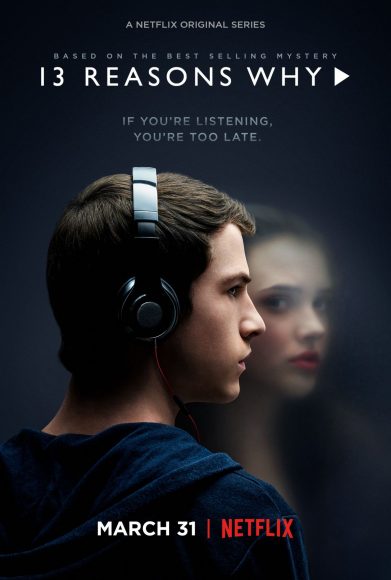We wanted to make you aware that the book, 13 Reasons Why, currently on the NY Times bestseller list, has been made into a Netflix series. This 13-episode drama is based on Jay Asher’s young-adult bestseller about Hannah Baker, a high school student who dies by suicide and leaves behind audiotapes detailing the events that led to her death. In each tape, she essentially blames her death on the actions (or inaction) of a group of classmates and a faculty member. That premise, along with a graphic scene depicting Hannah’s death, is contrary to the way psychologists and counsellors indicate suicide should be discussed with adolescents.
While every family has different values and guidelines for TV and movie viewing, we want you to know that the series has very mature themes and contains graphic and violent scenes. If your son or daughter is watching this, we strongly encourage you to review it so you can decide if it is appropriate for them to watch it, or so you are prepared to have thoughtful discussions about it. Here are some suggested talking points for you taken from the JED Foundation:
- People often identify with characters they see on TV or in movies. However, it is important to remember that there are healthy ways to cope with the topics covered in 13RW and acting on suicidal thoughts is not one of them.
- Suicide is not a common response to life’s challenges or adversity. The vast majority of people who experience bullying, the death of a friend, or any other adversity described in 13RW do not die by suicide. In fact, most reach out, talk to others and seek help or find other productive ways of coping. They go on to lead healthy, normal lives.
- Suicide is never a heroic or romantic act. Hannah’s suicide (although fictional) is a cautionary tale, not meant to appear heroic and should be viewed as a tragedy.
- It is important to know that, in spite of the portrayal of a serious treatment failure in 13RW, there are many treatment options for life challenges, distress and mental illness. Treatment works.
- Suicide affects everyone and everyone can do something to help if they see or hear warning signs that someone is at risk of suicide. Talking openly and honestly about emotional distress and suicide is ok. It will not make someone more suicidal or put the thought in their mind.
- Knowing how to acknowledge and respond to someone who shares their thoughts of emotional distress or suicide with you is important. Don’t judge them or their thoughts. Listen. Be caring and kind. Offer to stay with them. Offer to go with them to get help or to contact a crisis line.
- How the counsellor in 13RW responds to Hannah’s thoughts of suicide is not appropriate and not typical of most counsellors. Student counsellors are professionals and a trustworthy source for help.
- When you die you do not get to make a movie or talk to people any more. Leaving messages from beyond the grave is a dramatisation produced in Hollywood and is not possible in real life.
As always, if you have questions or would like to discuss this issue or any other social or emotional concern, please feel free to contact the our Discovery College Student Counsellors, Tracey Chitty or Evonne Drakousis.
| Websites | Recent Articles |
| The American Foundation for Suicide Prevention | The Washington Post |
| SAVE | USA Today |
| A Guide for Parents in Response to 13RW | |
| 5 Ways to Have a Conversation with Teens about 13RW |

